Royal Docks: London mayor removes developer from £1bn project
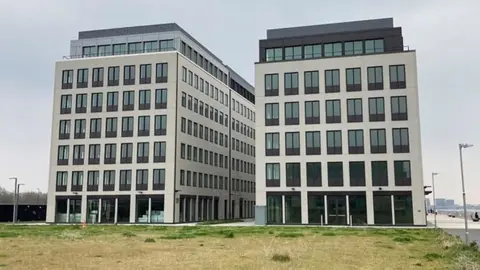 BBC
BBCThe developer in charge of a massive redevelopment of the Royal Docks has been removed from the project.
London Mayor Sadiq Khan has torn up a £1bn agreement with Chinese developer Advanced Business Parks (ABP), having become dissatisfied with progress on the flagship scheme.
The first phase of the project in east London was not completed and building work ground to a halt in 2019. Critics have spoken of a "wasted decade".
ABP has been contacted for comment.
The developer has experienced financial difficulties, with the situation said to have been worsened by the impact of Covid-19.
The project covers 35 acres (14 hectares) of derelict public land north of Royal Albert Dock, with plans for nearly five million sq ft (46,000 sq m) of development. About a tenth of the land has been built on so far.
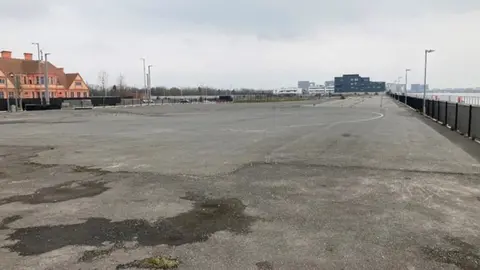
Boris Johnson awarded ABP the contract in 2013 when he was London's mayor, promising to turn the area into a financial and business sector to rival Canary Wharf.
The first phase would become a hub for the European headquarters of Chinese companies, it was pledged.
ABP built 21 office and retail blocks but at least 90% of the units are still empty.
A road called Mandarin Street runs through the development, which remains virtually deserted.
City Hall will leave what has been built so far in the hands of ABP, but the remaining five phases are to be entrusted to another developer.
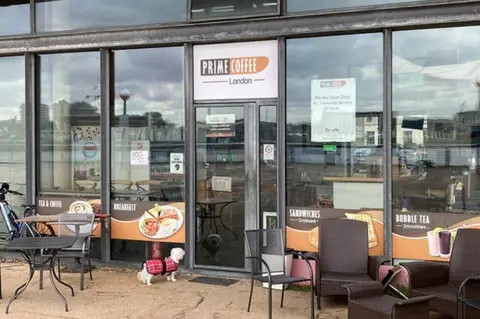
It's been a huge disappointment to local firms that hoped to benefit.
Ernie Matthews, who runs two coffee shops by the dock, said he had been expecting to open a third store but the anticipated footfall never materialised.
He said: "I am very disappointed with the slow progress, especially as small businesses like mine are scrambling to keep their heads above water.
"It doesn't feel like they've been pushing hard to give momentum to this."
Terminal notice
The Royal Docks is London's only Enterprise Zone, offering tax breaks and other business incentives to attract companies to the area.
Last summer the mayor issued a final termination notice to ABP, calling for assurances that it had the finances to continue.
Then in March a terminal notice was issued to ABP's parent company Dauphin Holdings.
In its latest accounts, ABP said it made a loss of £13m last year.
According to the Architects' Journal it also wrote off £11m, saying the coronavirus pandemic had "adversely affected the market for sale and rental developments".
Earlier this year the Sunday Times reported that ABP was £45m in debt and Chinese banks were asking for their money back.
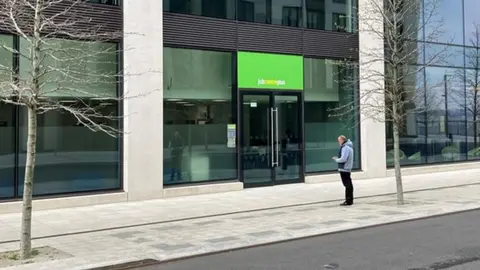
ABP has previously blamed Chinese restrictions on overseas investment and the impact of the pandemic, which deterred businesses from renting offices.
In recent months there had been some signs the rental situation was improving.
At the end of March, a Job Centre Plus opened in one of the blocks. Existing tenants also include Siemens and Advanteq, which were both offered early deals on rents and service charges.
Former Newham Council leader Sir Robin Wales has defended the deal, with which he was also involved. He said the combination of Covid-19 and restrictions on lending by Chinese banks could not have been predicted.
Mr Johnson originally announced the partnership at City Hall with great fanfare, and later attended a signing ceremony in Beijing - at a business park ABP had built on the edge of the Chinese capital.
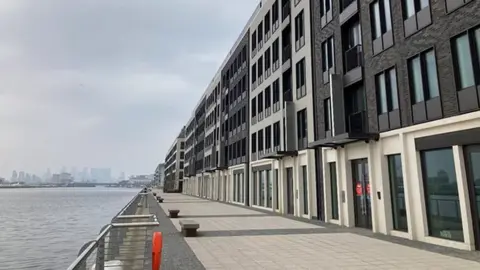
Little was known in London about ABP, but it won the contract when two UK-based construction companies dropped out of the bidding process.
There have been newspaper accusations of favourable treatment for the company. At one stage it shared offices in Beijing with representatives of the mayor's overseas promotion agency, London & Partners.
ABP was chosen precisely because it pledged to build the first phase quickly and speculatively, confident that Chinese firms would sign up and become the anchor tenants.
The company's chairman Xu Weiping - who lives in north London - told the BBC last year that he hoped to get the project back on track and wanted to turn the vacant office space into a collection of "mini-pods" where people could work and sleep.
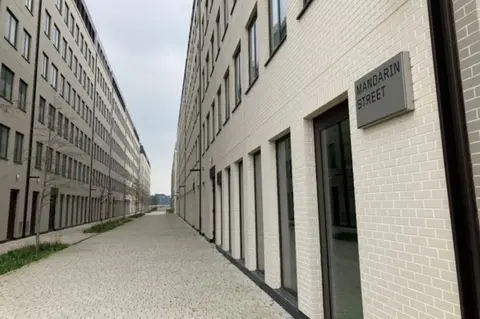
Critics of the deal and ABP's plans for the site say it's been a waste of almost a decade.
Eric Reynolds, from Docklands-based regeneration specialists Urban Space Management, said the development was poor and focused on "sterile" offices instead of a mixed community benefiting local people.
"If you or I fail individually on your mortgage, you get one or two chances, but eventually they take your home," he said.
"They've left a long-term problem because they have effectively crushed the space. It's not going to be flattened. We've got to work with it and it won't be easy."
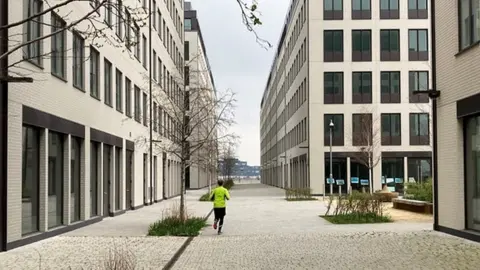
A spokesperson for the Greater London Authority said: "The Greater London Authority (GLA) has terminated the development agreement for the regeneration of Royal Albert Dock, which was signed in 2013 under the previous mayor, after neither ABP London Investment Ltd nor its guarantor, Dauphin Holdings Group, were able to meet the obligations in the agreement.
"This means that the vast majority of the site is now back under the control of the GLA.
"Royal Albert Dock remains an important site within the Royal Docks, with the opportunity to deliver thousands of new jobs. The GLA remains confident of the site's future success and will now consider the best way to bring forward its development."
Earlier this month Mr Khan launched plans to refurbish Grade-II listed flour factory Millennium Mills - the centrepiece of a £3.5bn regeneration of the south side of the docks.
The mayor said moving the GLA to a new home next to the Royal Victoria Dock showed his commitment to redeveloping the area.

Follow BBC London on Facebook, Twitter and Instagram. Send your story ideas to [email protected]
